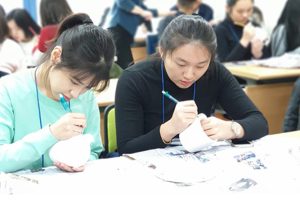After finishing my junior middle school back at home, I came to China for my further schooling in Qufu, Shandong — the hometown of Confucius, an ancient Chinese sage. In a fourth/fifth-tier town like this, there are not so many desired educational resources as in a big city, and I didn’t perform so well in my academic achievements, ranking approximately the fortieth in my class of over 70 students. However, I was the only one to be enrolled in the most prestigious institute of higher learning in China: Peking University.
Unlike my Chinese classmates, who had to sit for the grueling Chinese College Entrance Examination, I did the examination for overseas students, which covers four subjects: Proficiency in Chinese Language (PCL), Mathematics, English, and Comprehensive Liberal Arts. Largely at the academic level for a grade 10-11 student, the PCL exam might be a children’s play for my Chinese classmates, however, it is really hard for an overseas student like me. Yet, you must pass the Chinese Language exam, as you would be able to learn nothing here in China if you are very poor in your Chinese Language.
My Chinese language skill wasn’t so good. Sometimes, I could only get about half the full score in a 150-point exam. It was the same with my Comprehensive Liberal Art. Oppositely, I was more skilled at Mathematics and English and could come back with more than 120 points in exams.
After written exams came to an interview. At that time, I applied to Peking University and Renmin University of China. I went first for an interview at Peking University. There were 5-6 applicants in a team waiting for a one-hour-long interview, and most topics during the interview were about the general situations of China and current events in this country. Luckily, soon after, I received my admission notice from the University, and later, was admitted to the School of Journalism & Communication based on my voluntariness and the University’s assignment mechanism.
Studying at Chinese universities is cheaper than in South Korea. The tuition fee at Korean universities is typically equivalent to RMB 26,000 or so per semester. Despite being a self-funded student here, I only had to pay RMB 26,000 a year.
Yet, it seemed to me that the costs of accommodation at Chinese universities are a little bit higher. Here, price rates vary depending on housing conditions. It is roughly at RMB 130 per day for a single bedroom and RMB 80 per day for a chamber with 2 double rooms. I had once visited the dormitories of my Chinese schoolmates. Generally speaking, their rooms were rather well-equipped except for an independent restroom.
Most SK students in China are self-funded. In fact, there are too many SK students here. Except for a few standouts in academic achievements, it is hard for them to win a scholarship from their universities.
To the best of my observation, it might be much easier to win scholarships and receive allowances for those from countries with smaller overseas student populations, and to a less degree, those along the BRI routes, regardless of their academic achievements.
In addition, I also came to know an interesting phenomenon: many examinees at the College Entrance Examination for Overseas Students are, in essence, Chinese students. They, including some foreign citizens of Chinese origin, grow up in China. They are, in fact, Chinese with foreign passports.



